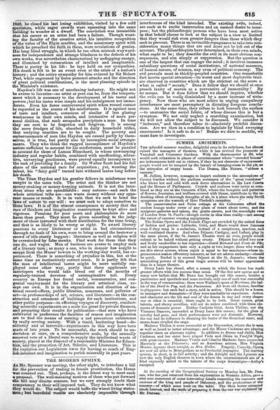THE MODERN SPHINX.
As Mr. Spooner was moving, the other night, to introduce a bill for the prevention of trading in female prostitution, the House was counted out. That, perhaps, is the fittest way to meet such s proposal. The well-meaning motives of those who put forward the bill may disarm censure, but we very strongly doubt their competency to their self-imposed task. They do not know what they would do. The subject would baffle the wisest living states- men; but beneficial results are absolutely impossible through
interference of the kind intended. The existing evils, indeed, are such as to excite lamentation and an earnest desire to inter- pose ; but the philanthropic persons who have been most active in that behalf choose to look at the subject in a view so limited that they would risk even greater dangers than those which they seek to prevent. There is an invincible repugnance to take into con- sideration many things that are and must not be left out of the account. The philanthropists have determined, in their own minds, what aught to be ; they describe the evil in its most obvious con- sequences, and aim simply at suppression. But the question is one of the largest that can engage the mind ; it involves immense subsidiary questions of social institutions, of national manners, of human nature, of science, nay even of political economy. The evil prevails most in thickly-peopled countries. One remarkable fact merits special attention—its worst and most deplorable trait are observed in countries which are the strictest on the score o what is called " morals." Does it follow that we should at once preach laxity of morals as a preventive of immorality By no means. But it does follow that we should inquire, whether the evils can be really diminished by a mere increase of strin- gency. Now those who are most active in urging compulsory interference are most peremptory in dictating foregone conclu- sions. At the same time, they refuse to look beneath the surface —to anatomize the social fabric, of whose disease this is but a symptom. We not only neglect a searching examination, but we will not allow the subject to be discussed. We consider it "indecent," and therefore taboo it—absolutely prohibit discus- sion. Are we then in a condition to legislate by blind sweeping enactments? Is it safe to do so ? Before we dare to meddle, we must dare to investigate.


























 Previous page
Previous page